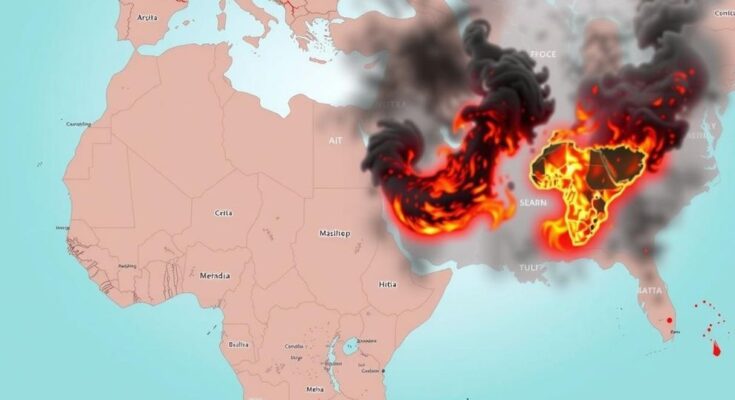UNHCR reports a significant surge of displaced persons fleeing Sudan to South Sudan, as over 20,000 crossed into South Sudan within a week. The FAO indicates a 12% drop in global wood and paper trade due to digital media dominance. Furthermore, gang violence in Haiti has displaced over 700,000 individuals, necessitating urgent humanitarian assistance.
The United Nations High Commissioner for Refugees (UNHCR) has conveyed serious concerns regarding a sharp increase in the number of displaced individuals fleeing conflict in Sudan to reach South Sudan. In just one week, over 20,000 individuals have crossed into South Sudan, marking a threefold increase in daily arrivals compared to prior weeks. A significant portion of these arrivals consists of South Sudanese refugees escaping camps in Sudan’s White Nile State amidst ongoing violence.
UNHCR spokesperson Olga Sarrado emphasized that the majority of those being displaced are women and children, highlighting the dire effects of conflict on vulnerable groups. The agency has noted that many people are fleeing not only due to immediate violence but also from fears about how the situation may escalate. Humanitarian teams are currently on the ground, but the challenging conditions are generating substantial concern for the provision of humanitarian aid.
In another pressing global issue, the UN Food and Agriculture Organization (FAO) has reported a steep decline in the trade of wood and paper products by 12 percent in 2023, primarily attributed to the growing prevalence of digital media. Following record levels of production in 2021 and 2022, the FAO indicated that global wood and paper exports fell by $64 billion to a total of $482 billion. Director of FAO’s Forestry Division, Zhimin Wu, remarked that this decline is also influenced by global supply chain disruptions, waning consumer demand, and trade restrictions.
Moreover, the situation in Haiti continues to deteriorate due to rampant gang violence, resulting in the displacement of over 700,000 civilians. Recently, the International Organization for Migration (IOM) reported that between December 6 and 8, more than 4,500 individuals were newly displaced amid the insecurity in the capital, Port-au-Prince. UN Spokesperson Stéphane Dujarric noted the severe impediments faced by those most vulnerable to these gang activities.
Despite these significant obstacles, humanitarian operations are persistently underway. The World Food Programme (WFP) successfully distributed over 100,000 hot meals to 24,000 people in the first week of December, while IOM has facilitated the distribution of water and medical care to thousands of displaced individuals. Recently, the Isaie Jeanty maternity ward in Cité Soleil reopened after a nine-month closure due to violence, thanks to the support of the UN Population Fund (UNFPA), which is supplying essential medical resources and equipment to assist expectant mothers in the community.
Humanitarian crises around the world are growing increasingly critical, with significant displacement caused by armed conflicts, as seen in Sudan and Haiti. In Sudan, the conflict between government forces and militia has triggered mass migrations to South Sudan. The rising trend of digital media is reshaping global markets, adversely impacting traditional industries like wood and paper production. In Haiti, ongoing gang violence exacerbates instability, leading to widespread displacement and escalating humanitarian needs. These events underline the urgent requirement for international humanitarian assistance and intervention to support affected populations.
In conclusion, the recent surge in displaced populations from Sudan to South Sudan highlights the severe humanitarian crisis exacerbated by ongoing conflicts. Similarly, the FAO’s report on the declining wood and paper trade due to digital advancements underscores the shifting economic landscape. Furthermore, the dire situation in Haiti, characterized by gang violence, calls for immediate and sustained humanitarian support. These developments illustrate the pressing need for global attention and resources to address these multifaceted crises affecting millions.
Original Source: www.miragenews.com




